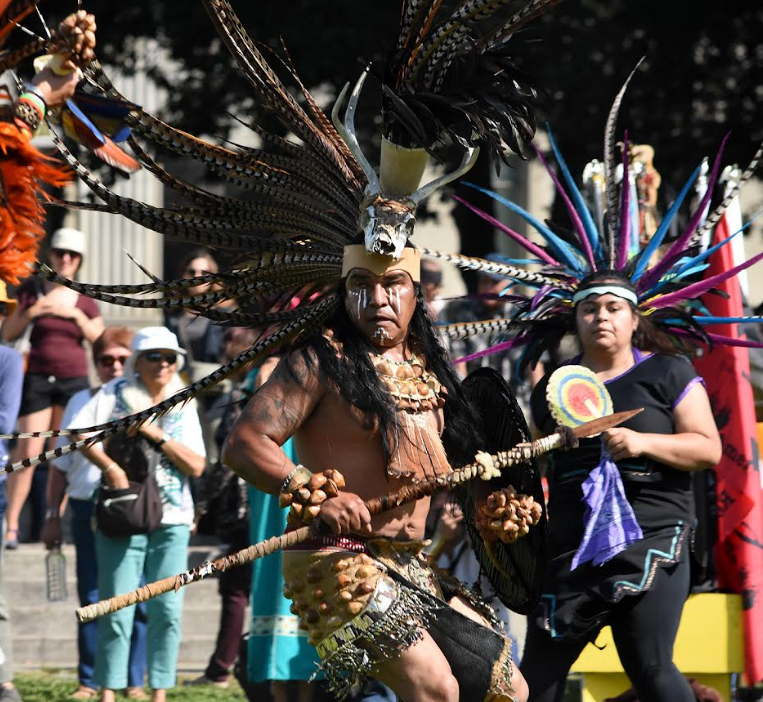
- Details
- By Native News Online Staff
On Monday, Americans will celebrate the millions of people who have lived on this land since time immemorial instead of a lone man who never stepped foot on North American soil.
That’s because Americans — including Native Americans — will be celebrating Indigenous Peoples’ Day rather than Columbus Day. Last year, President Biden issued the first-ever presidential proclamation declaring the second Monday in October Indigenous People’s Day to celebrate and honor the invaluable contributions and resilience of Native Americans.
The proclamation was the culmination of a decades-long effort by Native Americans to get the United States to cast aside Columbus Day in favor of honoring Indigenous communities and their inherent stewardship over the land.
Columbus Day celebrates Columbus’s landing in the Americas, an event that commenced centuries of colonial oppression and genocide of Native peoples. While not an official federal holiday in 1937, some communities had hosted parades and events to honor Columbus since 1792.
Since 1977, Native Americans have advocated for replacing Columbus Day with Indigenous People’s Day when the idea was first proposed at International Conference on Discrimination Against Indigenous Populations in the Americas. At the same time, Native organizations, like the American Indian Movement, were working to make Native Americans visible on the political stage as the country grappled with a contentious racial equity landscape.
In 1989, South Dakota — a state with one of the highest Indigenous populations in the country — was the first state to proclaim Indigenous People’s Day, officially celebrating the following year.
In 1991, the International Indian Treaty Council celebrated Indigenous Peoples’ Day on Alcatraz Island — which is Ohlone land — drawing a crowd of 300 people from Pier 33 in San Francisco for a sunrise ceremony with sacred fire.
During the quincentennial in 1992, the 500th anniversary of Columbus’s arrival in the Western Hemisphere, a group of Native Americans convinced the city council in Berkeley, California 1992, to replace Columbus Day with a day to commemorate Indigenous people.
In the following years, as Native communities continued to push for awareness around the atrocities committed against Indigenous peoples by Columbus, cities and states around the country began acknowledging Indigenous People’s Day. As of 2021, 15 states and 130 municipalities had proclaimed the second Monday in October Indigenous People’s Day ahead of President Biden’s proclamation.
Today and over the next few days, communities across the country celebrate Indigenous People’s Day with prayer vigils, powwows, symposiums, concerts, lectures, rallies and more to acknowledge the sovereignty, cultures, history and languages of Native peoples. The day also marks an opportunity to move forward together armed with an understanding of our history into a kinder, more compassionate and equitable future.
More Stories Like This
Native News Weekly (August 25, 2024): D.C. BriefsUS Presidents in Their Own Words Concerning American Indians
Senate Passes Funding Deal, Partial Government Shutdown Likely as House Delays Vote
Mistrial Declared After Hung Jury in Nick Tilsen Case
Native Organizers Respond to Vote on Department of Homeland Security Funding
Help us defend tribal sovereignty.
At Native News Online, our mission is rooted in telling the stories that strengthen sovereignty and uplift Indigenous voices — not just at year’s end, but every single day.
Because of your generosity last year, we were able to keep our reporters on the ground in tribal communities, at national gatherings and in the halls of Congress — covering the issues that matter most to Indian Country: sovereignty, culture, education, health and economic opportunity.
That support sustained us through a tough year in 2025. Now, as we look to the year ahead, we need your help right now to ensure warrior journalism remains strong — reporting that defends tribal sovereignty, amplifies Native truth, and holds power accountable.
 The stakes couldn't be higher. Your support keeps Native voices heard, Native stories told and Native sovereignty defended.
The stakes couldn't be higher. Your support keeps Native voices heard, Native stories told and Native sovereignty defended.
Stand with Warrior Journalism today.
Levi Rickert (Potawatomi), Editor & Publisher


